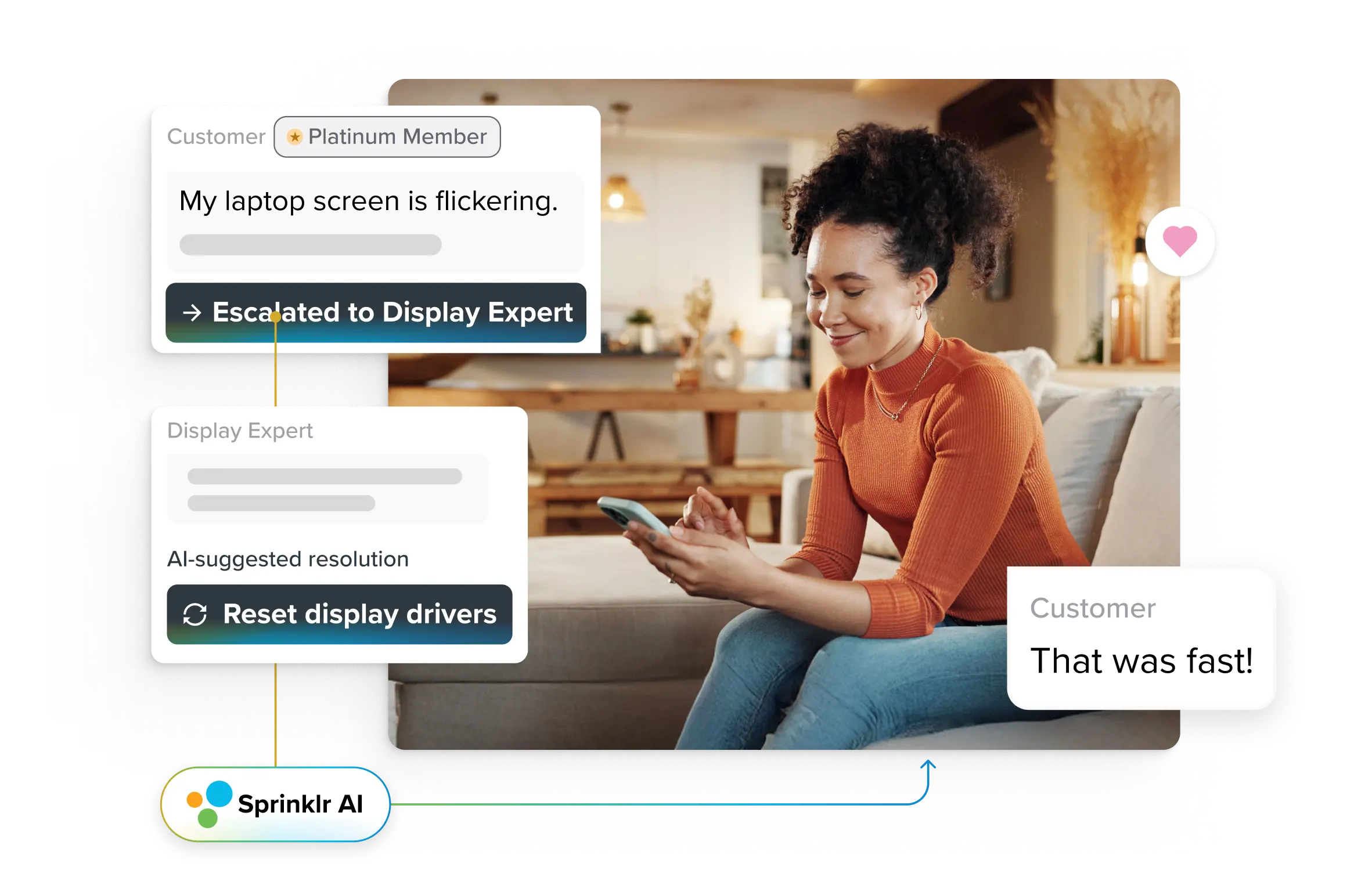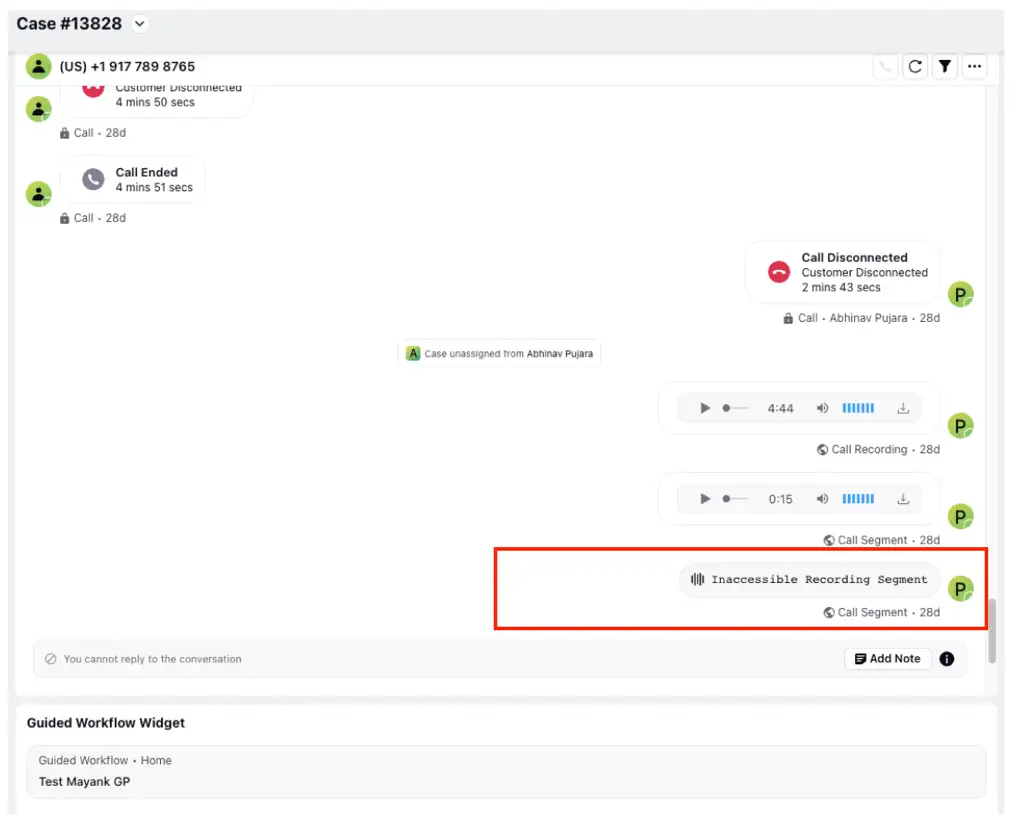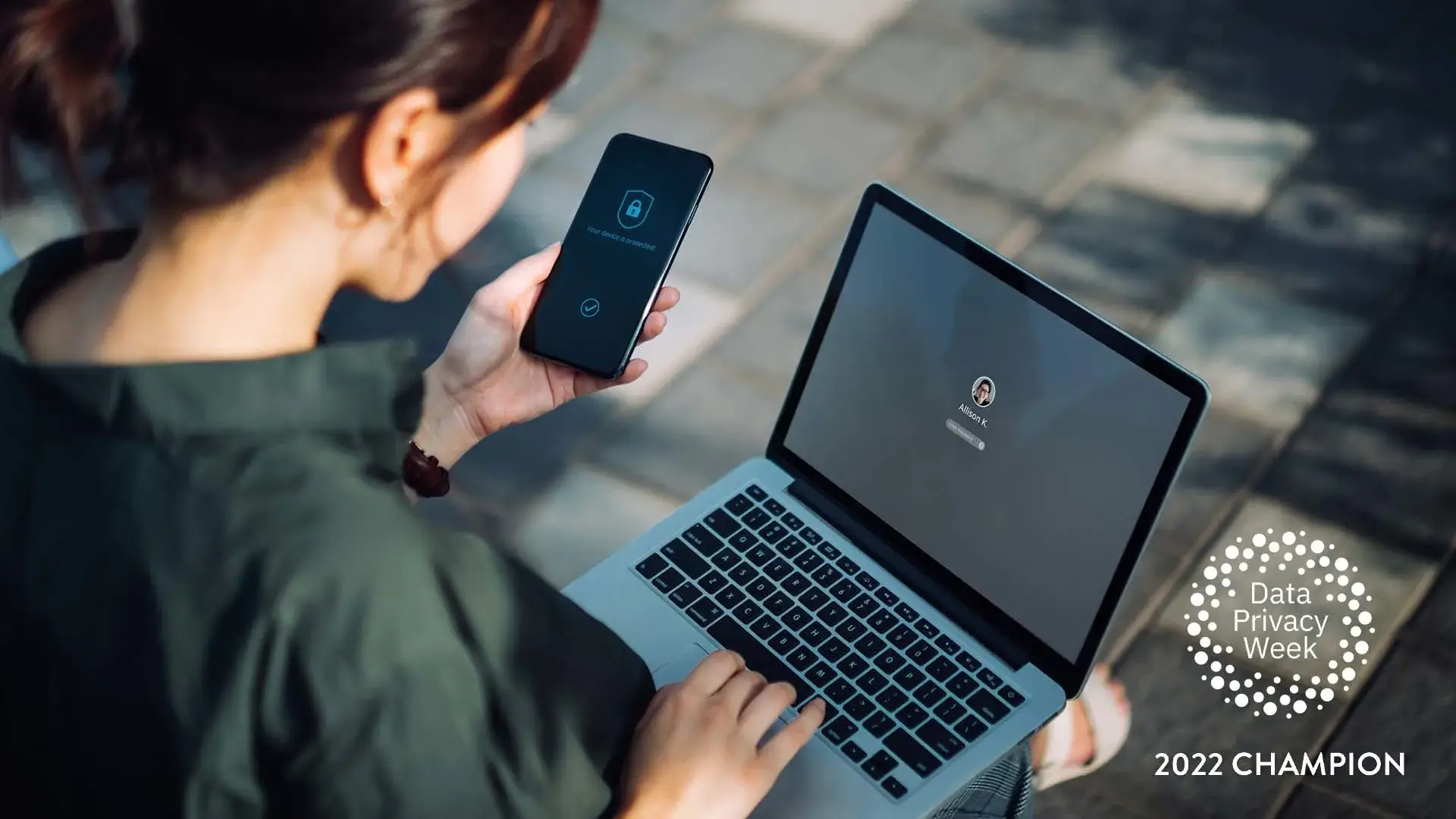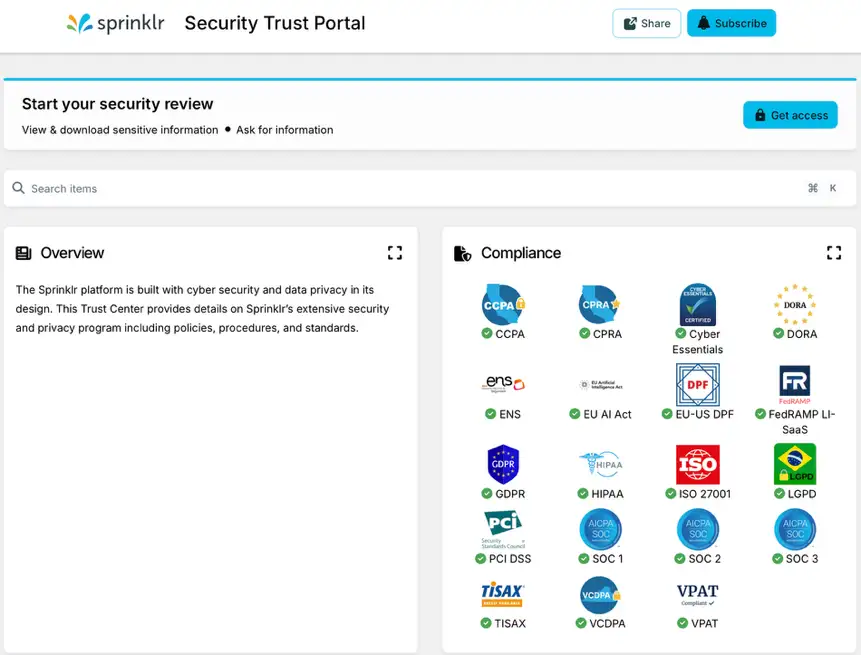Transform CX with AI at the core of every interaction
Unify fragmented interactions across 30+ voice, social and digital channels with an AI-native customer experience platform. Deliver consistent, extraordinary brand experiences at scale.

Customer Service Call Recording Laws: Rules You Must Follow
"This call may be recorded for training and quality purposes."
Sound familiar? It's the line customers hear just before speaking to an agent through IVR. But for businesses, this simple disclaimer carries enormous weight, helping them avoid penalties that could cost hundreds of thousands of dollars.
While it may seem like a routine process, customer service call recording is anything but straightforward. Laws governing call recordings vary widely across geographies, bringing layers of nuance and technicalities that many businesses may overlook.
In this blog, we'll explore why adhering to customer service call recording laws is crucial, how these regulations differ globally, and actionable compliance tips to manage compliance — especially as your business scales internationally.
What are customer service call recording laws
Customer service call recording laws safeguard individuals' privacy whenever businesses record phone conversations. In the United States, these laws are governed by a combination of federal and state regulations, with the Federal Communications Commission (FCC) and state governments playing pivotal roles.
The primary purpose of these laws is to balance operational needs with privacy rights. For example, while a contact center might record calls for training, quality assurance, or regulatory compliance, obtaining consent is critical to maintain both trust and legal compliance. The type of consent required varies significantly across states, whether from one party on the call (single-party consent) or all participants (two-party or all-party consent).
These laws go beyond mere compliance and underscore the importance of accountability and transparency. Recorded conversations often contain sensitive information, such as financial details, personal identifiers, or confidential concerns. Mishandling such data can result in breaches of trust, reputational damage, or even security vulnerabilities.
By understanding and adhering to these laws, you demonstrate respect for customer boundaries, safeguard their information and foster long-term trust, while avoiding legal and financial risks.
Importance of following customer service call recording laws
Complying with customer service call recording laws isn’t limited to saving your business from penalties. Here are a few other reasons to follow them:
- Regulatory compliance and avoiding penalties
Non-compliance with call recording laws can lead to significant fines and legal challenges. For instance, under the California Consumer Privacy Act (CCPA), you can face penalties of up to $2,500 per violation or $7,500 per intentional violation.
Similarly, the General Data Protection Regulation (GDPR) in the European Union imposes fines of up to €20 million or 4% of annual global turnover, whichever is higher. These regulations highlight the importance of obtaining proper consent and handling recorded data responsibly.
- Ensuring customer privacy and security
Respecting customer privacy is fundamental to maintaining trust. Recording calls without consent can lead to privacy breaches, resulting in a loss of customer confidence.
A Cisco study revealed that 60% of consumers have lost trust in organizations because they use AI to handle personal data. Following call recording laws demonstrates a commitment to protecting customer information and fostering customer loyalty and trust.
- Reducing legal complexities and risks
Adhering to call recording laws helps you avoid legal disputes and the complexities associated with litigation. For example, in a recent settlement administered by Kroll, a company faced a class-action lawsuit for recording customer calls without proper consent, resulting in significant settlement payments.
In this case, the per-call value amounted to over $850, with some class members receiving payments exceeding $10,000. Such cases highlight the legal risks of non-compliance and the importance of adhering to established regulations to mitigate potential lawsuits.
🔖Build Your Base: Call Center Recording: A Detailed Guide
Customer service call recording laws by top countries
Call recording laws differ worldwide. While it's good to have a broad understanding, focusing on the regulations where your business operates is crucial. Let’s start with the United States.
📌IMPORTANT
This information is for general knowledge and informational purposes only, is not comprehensive, and does not constitute legal advice. You should consult with legal professionals for specific guidance on call recording laws across different jurisdictions.
🇺🇸 Customer service call recording laws in the US
In the US, call recording laws vary between federal and state levels. Federally, the law requires at least one party's consent to record a conversation. However, some states mandate all parties' consent.
For instance, California and Florida require all participants to agree, while Texas and New York follow the one-party consent rule. This patchwork of regulations requires you to carefully assess the laws in each state they operate to avoid non-compliance.
Best practices when following call recording laws in the US
✅ Enable automated notifications to play before each call, informing all parties that the conversation may be recorded.
✅ After the notification, explicitly ask for verbal consent to proceed with recording, especially in all-party consent states. Learn how conversational IVR plays a role here.
✅ Maintain comprehensive logs of the consents obtained, including the date, time and specifics of the call, to demonstrate compliance during audits or disputes.
🇦🇺 Customer service call recording laws in Australia
In Australia, call recording regulations are governed by federal, state, and territorial laws. The Telecommunications (Interception and Access) Act 1979 prohibits call recording without consent of all parties at the federal level. Each state and territory has their own legislation regarding the use of listening devices as well:
- All-party consent required: In New South Wales, South Australia, Tasmania, Western Australia and the Australian Capital Territory, all parties involved in a conversation must consent to the recording.
- One-party consent permitted: In Victoria, Queensland and the Northern Territory, it's legal to record a conversation if at least one-party consents in certain circumstances.
🇬🇧 Customer service call recording laws UK
In the UK, call recording is primarily regulated by the UK GDPR [AB1] and the Data Protection Act 2018.
Both the UK GDPR and the Data Protection Act require that individuals are informed about the recording and its purpose, ensuring transparency and protecting personal data.
🇨🇦 Customer service call recording laws in Canada
In Canada, call recording is governed by the Personal Information Protection and Electronic Documents Act (PIPEDA).
Under PIPEDA, organizations must obtain meaningful consent from individuals before collecting, using or disclosing personal information, including recording telephone conversations
📌 Also note
In many jurisdictions, you must:
- Provide products or services even if the individual declines to consent unless the information is crucial for completing the transaction.
- Gather information through lawful and fair methods.
- Maintain personal information policies that are transparent, easy to understand and accessible to the public.
🇮🇳 Customer service call recording laws in India
In India, call recording is not explicitly governed by a specific statute. However, the Digital Personal Data Protection Act and Information Technology Act of 2000 provide a framework concerning electronic communications and privacy.
For private entities, recording calls without consent may infringe upon an individual's right to privacy. The right to privacy is protected under Article 21 of the Indian Constitution, as recognized by the Supreme Court of India in the landmark judgment of Justice K.S. Puttaswamy (Retd.) vs. Union of India (2017).
🎯 Expert Tip
Engage legal counsel to ensure that your practices comply with a jurisdiction’s evolving legal landscape concerning privacy and data protection. Additionally, consider implementing technological solutions that allow for real-time monitoring and management of consent, providing an added layer of compliance and transparency.
🇦🇪 Customer service call recording laws in the UAE
Recording conversations without consent in the UAE is generally prohibited under Federal Law No. 5 of 2012 (Cybercrime Law). This legislation expressly forbids, going so far as to impose criminal liability for recording communications without the explicit permission of all parties involved. [AB1]
Using recordings obtained without consent in legal proceedings can lead to significant complications. Courts may deem such evidence inadmissible, particularly if it breaches privacy laws, underscoring the importance of strict adherence to the regulations.
Best practices when following call recording laws in UAE
✅ Inform all parties and secure their agreement before initiating any call recording. Record calls only when absolutely necessary, such as for compliance or quality assurance purposes.
✅ Given the UAE's linguistic diversity, ensure your consent scripts are available in Arabic and widely spoken expatriate languages like English, Hindi or Urdu to guarantee clarity for all parties.
✅ Be mindful of local cultural norms and religious considerations when interacting with customers.
👥 Quick Tip
Investing in a dedicated compliance officer is invaluable in a jurisdiction where non-compliance can result in severe penalties. The professional can monitor evolving regulations, flag potential risks and ensure consistent adherence to the jurisdictions’ evolving laws — saving your business from costly fines and reputational damage.
🇩🇪 Customer service call recording laws in Germany
Recording telephone conversations in Germany without all parties' consent is strictly prohibited under Section 201 of the German Criminal Code (Strafgesetzbuch, StGB). This law safeguards the confidentiality of spoken communication and violations can result in fines or imprisonment.
In addition, the Federal Data Protection Act (Bundesdatenschutzgesetz, BDSG), General Data Protection Regulation (GDPR), and e-Privacy Directive enforce stringent rules on processing personal data, including recorded conversations. These regulations require organizations to obtain explicit consent, specify the purpose of data collection, and adhere to strict data protection standards.
🎯 Pro Tip
✅ Define limited retention periods for recorded conversations in compliance with GDPR. Automated deletion mechanisms ensure that no data is retained beyond its lawful purpose.
✅ Inform callers beforehand about the recording process, its purpose and their rights. Disclosures should be available in the jurisdiction’s official or the most widely spoken language to ensure clarity and inclusivity.
🇫🇷 Customer service call recording laws in France
In France, recording telephone conversations without all parties' consent is prohibited under Article 226-1 of the French Penal Code. This provision protects individuals’ privacy by criminalizing the recording, storage or transmission of private conversations without explicit consent.
Violating these laws can result in severe consequences, including fines and imprisonment. Additionally, the General Data Protection Regulation (GDPR) and ePrivacy Directive govern handling recorded conversations as personal data, requiring organizations to establish a lawful basis for processing and adhere to strict compliance standards.

🇪🇸 Customer service call recording laws in Spain
In Spain, recording telephone conversations without the consent of all parties is generally prohibited under Article 18 of the Spanish Constitution, which guarantees the right to secrecy of communications.
Additionally, the Organic Law 3/2018 on the Protection of Personal Data and Guarantee of Digital Rights (LOPDGDD), General Data Protection Regulation (GDPR), and ePrivacy Directive impose strict requirements on processing personal data, including recorded conversations. Violations can lead to significant fines and legal consequences.
🎯 Best practices
✅ Set up call recording systems to activate or deactivate based on the caller’s location, ensuring automatic compliance with the jurisdiction’s regulations.
✅ Implement policies to delete or anonymize recorded calls after a specified period, aligning with the jurisdiction’s stringent data retention laws and GDPR’s “right to be forgotten” clause.
Compliance tips for customer service call recording laws
We’ve gone through some country-specific regulations and best practices, but now it’s time to get hands-on. What exactly can you do and how? Here are some actionable tips to help you ensure compliance while enhancing your customer service game.
- Understand the legal landscape in your operating regions
The rules around call recording can shift drastically depending on jurisdiction. If you operate across borders, you should invest in legal expertise or use location-based compliance automation tools that detect a caller's region and apply appropriate consent protocols, enabling compliance everywhere you operate.
- Make consent clear, transparent and accessible
Transparency is a trust-building opportunity. Inform customers explicitly that their call will be recorded and secure their verbal or written consent before proceeding. A well-crafted IVR message or email opt-in can do the heavy lifting here.
For example, if you are an e-commerce company planning to go global, you could implement a multi-language consent script tailored to the caller’s preferred language beforehand, fostering clarity and trust.
🕵🏻 Customer consent is just the start — What about internal access?
While securing customer consent is critical, ensuring internal access to voice recordings is equally vital for regulatory compliance and trust. Traditional models that allowed blanket access to all recordings are no longer viable, given the heightened scrutiny around data privacy.
Sprinklr addresses these challenges with dynamic recording segmentation and transcript segmentation features.
- Dynamic recording segmentation: Automatically segment recordings when participants join or leave calls. This allows only authorized individuals — like managers or auditors — to access specific parts of a call, reducing the risk of unauthorized exposure.
- Transcript segmentation: Aligns transcripts with segmented recordings, limiting access to only authorized portions. This allows sensitive data to remain restricted, enabling adherence to GDPR and other global privacy standards.
By prioritizing granular access control, Sprinklr empowers you to maintain robust data governance while fostering transparency and compliance.


- Implement data minimization and retention policies
Only record and store what’s absolutely necessary. GDPR and other privacy laws emphasize the principle of data minimization, which means avoiding over-collection of sensitive information. Furthermore, automated deletion policies should be set to erase or anonymize data once it’s no longer needed.
For instance, if you run a financial services firm, you might retain recordings for six months to resolve disputes but erase or anonymize them afterward to comply with GDPR and reduce storage costs.
💡 Did you know
One of Sprinklr’s guiding privacy principles is its commitment to processing only the personal data necessary to achieve specific purposes while actively enabling data retention practices. This ensures that data is not retained longer than needed, helping organizations stay compliant and efficient.
Trust is integral to Sprinklr’s business model. Sprinklr sees privacy as a fundamental aspect of its services and actively supports its customers in meeting data protection requirements.
Sprinklr’s legal and compliance team works closely with its security and product teams to monitor evolving data privacy regulations and promoteongoing compliance with major laws, including GDPR, CCPA/CPRA and LGPD.

- Leverage localized customer service outsourcing
Partnering with outsourced service providers in specific regions can streamline compliance with local call recording laws while improving customer satisfaction. Local teams are often well-versed in regional regulations and cultural nuances, ensuring seamless communication and lawful practices.
🔖 Bookmark Now: Customer Service Outsourcing: A Detailed Guide for 2024
Stay compliant, stay secure with Sprinklr
Adhering to customer service call recording laws is vital for businesses operating in today's highly regulated environment. From obtaining proper consent to safeguarding sensitive data, each step you take helps build trust with your customers while ensuring your business remains legally secure. As you navigate these complex requirements, it's clear that having the right tools in place is crucial to avoid costly mistakes.
Sprinklr Service provides a holistic, all-in-one customer service suite designed to streamline compliance and help you meet the demands of global regulations. From multi-language consent options and clear notification systems to robust access control mechanisms and automated data retention, Sprinklr ensures that your business stays on top of evolving compliance requirements— without the manual hassle.
Book a demo of Sprinklr Service today and discover how the platform can streamline compliance and improve customer interactions
Frequently Asked Questions
Penalties for violating call recording laws vary by region. In the United States, federal and state fines can range from $500 per day per violation to millions in class-action settlements, depending on the severity and intent. Under GDPR in Europe, fines can reach up to €20 million or 4% of annual global turnover, whichever is higher.
To obtain and manage consent effectively, transparently inform customers at the start of any interaction that calls may be recorded, stating the purpose (e.g., quality assurance or compliance). Use automated disclaimers for phone calls and consent notices in digital channels like chat. Ensure compliance with local laws, distinguishing between one-party and two-party consent jurisdictions. Provide clear opt-out options without penalizing service quality, and document consent securely for compliance purposes. Regular updates to your policies and robust data protection measures ensure ethical and legal handling.
Under GDPR Article 6, the processing of personal data, including call recordings, requires a valid legal basis such as consent, legitimate interest, or legal obligation, alongside clear communication about usage and storage. Customers have rights to access, correct, or delete recorded data. CCPA mandates informing customers about recording and data usage while offering opt-out options and ensuring they retain service access. Both frameworks emphasize minimizing data retention and protecting recordings with encryption and limited access to ensure compliance.
Call recording enhances service quality by providing insights for training and identifying areas for improvement. Managers can use recordings to monitor agent performance, refine communication strategies, and resolve disputes effectively. Analyzing recorded interactions helps identify recurring customer pain points, enabling proactive solutions. AI-driven analysis of call data can uncover sentiment trends and boost personalization, further improving customer experiences.
Implementing call recording laws can be complex due to varying jurisdictional requirements like one-party or two-party consent, especially for businesses operating globally. Ensuring proper consent processes without disrupting customer experience is a challenge. Additionally, secure storage, encryption, and restricted access are essential but resource intensive. Regular updates to stay compliant with evolving regulations like GDPR or CCPA demand ongoing legal and operational vigilance.










